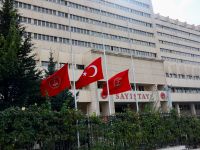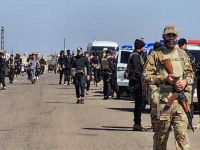MEES learns from authoritative sources that the Iraqi political authorities, having decided last November to impose a surcharge on oil exports to be paid outside the UN escrow account, have now decided to stick with their demand despite its negative impact on Iraqi oil exports.
It is further understood that the authorities have institutionalized the new system with modifications, the clear implication being that it will remain in place over the long haul.
Furthermore, there are signs that some international oil companies (IOCs) are exploring ways of accommodating the Iraqi demand.
The original surcharge communicated to IOCs was 50 cent/B, which has since been reduced to 40 cents/B. However, it is understood that further modifications have now been introduced providing for the Kirkuk crude surcharge to be less than that for Basrah Light, for certain countries that have special trade relations with Iraq to be exempted and for barter arrangements to conceal the exact surcharge in some deals.
MEES soundings indicate there is considerable confusion in the market about the exact level of the surcharge for each cargo, especially since some primary lifters maintain that they are not paying any surcharges and are even signing letters to secondary buyers to this effect. The UN finds it difficult to check such claims.
It now appears that Baghdad decided on the surcharge in the belief that the IOCs would cooperate regardless of Security Council resolutions and that, if they did not, a cut-off of Iraqi oil supplies would raise prices substantially.
Consequently, there was disappointment and confusion in political and oil circles in Baghdad when, after the threat was carried out and the oil flow stopped, prices nonetheless declined by $10/B in December as the IOCs refused to lift Iraqi crude.
The problem is that instead of admitting the mistake and reversing the decision, the Iraqi authorities decided to persist with the surcharge irrespective of the consequences.
Since then, Iraqi oil exports have been patchy, averaging around 600,000 b/d in December, compared to 2.1mn b/d in November.
Having lost its main customers, SOMO started signing agreements with very small trading firms, awarding them more than the usual volumes allocated to such companies in the past.
One of the newest contracts to be awarded was to the Malaysian firm Mastek (4mn barrels of Basrah Light and 2mn barrels of Kirkuk in January and another 6mn barrels in February).
Exactly how many contracts have been signed under the current 9th phase is not clear, especially since the UN overseers decided to amalgamate the unperformed contracts from the 8th phase with those of the 9th phase, bearing in mind that SOMO signed a significant number of contracts in the last few days of the 8th program in the knowledge that they could not be executed on time.
As of 16 January, there were 68 approved oil purchase contracts for 128.6mn barrels of oil waiting to be lifted, comprising almost 75mn barrels of Basrah Light and 53.6mn barrels of Kirkuk.
Now that it has become clear that Baghdad intends to go ahead with the surcharge, the main question for the markets is whether and at what level the Iraqi oil shortfall will continue during February or whether Iraqi exports will return to normal levels next month, as was asserted by Iraqi oil officials last week. The answers are far from clear.
Three recent developments have contributed to the present fluid situation:
Russian firms that used to lift approximately one-third of Iraqi oil exports are gradually returning as primary buyers. Several firms have signed contracts with SOMO (Sidanco, Machinoimport, Slavneft, Zarubzhneft and Actec).
If this trend continues, it is likely to encourage other primary lifters such as the Chinese and the Vietnamese to come forward as well.
Two major international oil firms – one US, one European – have lifted Iraqi crude as secondary buyers. This may open the door for other major IOCs to do the same, since it increases the level of safety of buying Iraqi oil.
In fact, several traditional US customers for Iraqi crude are looking around for trading firms to sign deals with SOMO so that they can buy from them.
MEES understands that major European firms that were primary lifters of Iraqi crude are now reviewing the situation in light of recent developments.
They are studying the possibility of becoming secondary lifters if the price is appropriate, if there is no explicit payment of the surcharge and if they find a supplier that is willing to accept a penalty in case of non-delivery.
However, MEES understands that Japanese companies will continue to refrain from lifting Iraqi crude for two reasons: the political complexity of the situation, and concerns over the operational problems of sending vessels to Mina al-Bakr, where several companies have recently experienced delays and have even failed to lift because of differences with SOMO.
OPEC has cut production by 1.5mn b/d. This means there is a possibility that some companies which are short of crude may revert to buying Iraqi crude.
While Iraqi oil exports under the oil-for-food program this month may be even lower than December (what can be confirmed so far is around 548,000 b/d – 13mn barrels of Basrah Light and 4mn barrels of Kirkuk), it is still too early to make any call as to what the level might be in February.
In other related news:
President-elect George Bush has blamed Iraq’s President Saddam Husain for instability in oil markets. He told Reuters on 18 January that “I think it’s too complicated to blame our friends. For example, one of the real wild cards in the world today is Saddam Husain.
He controls a lot of oil and he is certainly not our friend. To the extent that prices are unstable, there are some who can affect the price who aren’t friends of ours.” Referring to the Iraqi leader, Mr Bush added: “I do think he is a big threat.
I do think he is a big threat to our friends in the Persian Gulf and he is a threat to Israel. Yes, we must continue to contain Saddam Husain and we must watch his money and make sure he doesn’t develop weapons of mass destruction.”
Iraqi Deputy Foreign Minister Nizar Hamdoon announced on 16 January that his country “will accept no less than a total lifting of the embargo during its dialogue with UN Secretary-General Kofi Annan” at end February.
He added that “this dialogue must be without preconditions, open and without a prearranged agenda. The agenda will be subject to agreement during the meeting.”
UK junior Foreign Office Minister Peter Hain said on the same day that “if Saddam was willing, even without prejudice to final acceptance of resolution 1284, to discuss with the UN the terms on which arms inspectors would operate and the modalities of suspension of sanctions, I think he would find reasonable people willing to do business.”
Iraqi Vice-President Taha Yasin Ramadan visited Egypt last week and signed a free-trade agreement establishing a joint trade zone and abolishing all tariffs and duties between the two countries.
Egyptian exports to Iraq under the oil-for-food program totaled $1.2bn in 2000 (making Iraq the second largest export market for Egypt after the US), with plans to increase exports to $2bn in 2001, if Egyptian firms purchase Iraqi oil to balance the trade volume between the two countries.
The Saudi land transport company Mabrad signed a deal with its Iraqi counterpart to carry supplies directly to and from Iraq and Saudi Arabia, after the UN approved the opening of the border transit point at 'Ar'ar.
Saudi Arabia exported $293mn worth of supplies to Iraq in 1999 under the oil-for-food program and over $600mn in 2000.
The UN criticized Iraq on 18 January for not ordering enough humanitarian supplies. Benon Sevan, the head of the UN Office of the Iraq Program, said that during the 8th phase that started on 9 June, 2000 Iraq had been allotted $7.798bn for the six-month program but submitted orders for only $4.265bn. Of this amount, some $2.742bn has been approved by the UN while the remainder is pending.
Another $783.8mn had been put on hold by the sanctions committee.
The Clinton administration has approved a $12mn plan to help the opposition Iraqi National Congress (INC) to reestablish operations in northern Iraq.
Iraq asked the UN on 18 January to open an investigation into the effects of depleted uranium on Iraq during the Gulf war.
(mees)
© 2001 Mena Report (www.menareport.com)








